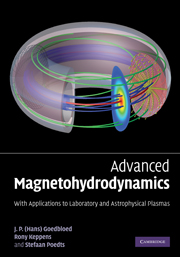19 - Computational nonlinear MHD
Published online by Cambridge University Press: 05 March 2013
Summary
In Chapter 15, we introduced basic concepts for solving linear MHD problems computationally. In principle, the various options discussed there for discretizing a set of partial differential equations in space and time can all be adopted for simulating nonlinear MHD phenomena. Many suitable combinations of spatial (finite difference, finite element, spectral) and temporal (explicit or implicit) discretizations have successfully been applied in problem-specific contexts. However, the conservation law nature of the ideal nonlinear MHD equations poses additional challenges when discontinuous, shock-dominated evolutions are computed. In this chapter, we pay particular attention to certain variants of “shock-capturing” schemes, which have proven to be of general use for nonlinear hyperbolic equations. We explain fundamental strategies and some of the difficulties encountered upon application of these schemes to the MHD system. This is then again illustrated with examples of their use, including simulations determining the nonlinear evolution of MHD instabilities, as well as advanced computations of astrophysically relevant MHD processes, up to modern solar system space weather models. A brief discussion of alternative algorithmic approaches is included as well, complemented with representative applications.
For simulations involving a hierarchy of temporal scales, one must again handle the time scale problem by some (semi-)implicit time integration method. We limit their discussion to some exemplary treatments in computational nonlinear MHD, focused on resistive mode developments and wave dynamics in externally driven systems. We conclude with an impression of state-of-the-art global simulations of laboratory tokamak plasmas, where even extended MHD models are beginning to be applied.
- Type
- Chapter
- Information
- Advanced MagnetohydrodynamicsWith Applications to Laboratory and Astrophysical Plasmas, pp. 407 - 486Publisher: Cambridge University PressPrint publication year: 2010



